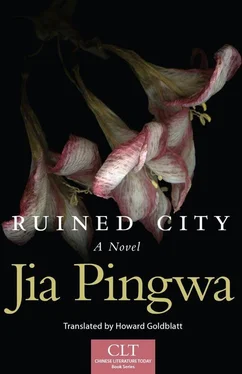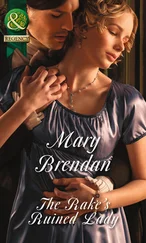When Zhou heard that it was a recording of The Butterfly Lovers , he asked Zhuang whether he enjoyed folk music.
His mouth full, Zhuang just nodded.
“I have another tape,” he said a moment later. “The quality is poor, but it’s wonderful music.” He changed the tape. Deep, slow, lingering music spread out like water.
“That is an instrument called the xun. Where did you get it?” Zhou asked.
Proudly, Zhuang replied, “Have you noticed that someone often plays the instrument in the mornings and evenings on the city wall? One night I went out and recorded it from a distance, which is why it sounds fuzzy. But if you close your eyes and imagine you’re there, you’ll feel as if you were in a primitive world, with pining ghosts and will-o-the-wisp sparks. You enter a pitch-black ancient forest and can hear a dewdrop rolling slowly down a branch, where it hangs precariously before crashing to the ground. You sense something fearful and mysterious, but can’t suppress your fervent desire to explore. You walk deeper into the forest, where you see miasma surging, followed by spiky rays of sunlight slanting in through the tree branches and miasma. But you can no longer find your way back.” Zhuang was so caught up in his narration that he laid down his rice bowl.
“Is that a lyrical poem, Zhuang Laoshi?” Liu Yue asked.
Zhuang saw Zhou lower his head. “Doesn’t it make you feel that way, Zhou Min?”
“That’s me playing the xun, Zhuang Laoshi.”
Zhuang let out a soft cry, his mouth hanging open. Niu Yueqing and Liu Yue stopped eating.
“I was just playing it to pass the time. I never expected you to hear it. But if you really like it, I will make a better recording for you another day. What I don’t get is, you’re a celebrity now and can have anything you want. Whatever you set your mind on will be yours, and yet you like xun music.” When he finished, he took a small black clay object from his bag and told them that it was a xun. Zhuang, who had heard the sound but never seen the instrument, took it and marveled over how unique it was. He asked Zhou where he had bought it, adding that he had inquired at a musical instrument shop, but the salesperson did not even know what a xun was. Zhou Min said it was an ancient instrument that few people played these days. He had studied with an old folk musician in Tongguan after hearing the man play. Later, when he came to Xijing, he dug the instrument out while he was working at the Clear Void Nunnery; he was the only one who knew what it was, so he kept it out of sight before he went up to the city wall to practice, playing whatever came to mind. They carried on a spirited conversation.
“I don’t know why,” Zhuang said, “but here’s some music I really like. I bought a tape of it. I’ll play it for you. It’s quite intense.” He put it in the tape deck, from which emerged funereal music. Niu Yueqing came up and stopped it. “Who ever heard of enjoying this?”
“Be patient and listen. You’ll like it when it begins to speak to you,” Zhuang said.
“I’ll never like it. People are going to think someone in our family died when you play that.”
With an unhappy smile, Zhuang turned off the cassette player and sat down to eat.
“So Zhuang Laoshi is henpecked?”
“I’m not. It’s just that she’s not cowed by me.”
Niu Yueqing ignored his response, so he muttered, “This is good porridge.” He laid down his chopsticks and asked Zhou if he was free to go see Meng Yunfang.
Zhou looked uncomfortable as he hemmed and hawed. “Actually, I do want to talk to you about something, but I’ll wait until you’re done eating.”
“I’m done, so go ahead.”
“I thought I’d repay your kindness with some of my own, which is why I wrote the article. I wanted to promote you, and never expected to cause so much trouble. Jing Xueyin has raised a fuss. The higher-ups in the department may come to you for verification, so I’m here to see what you have to say.”
“Zhuang Laoshi and I have read the article,” Niu Yueqing said, sending Zhou into a minor panic.
“So you’ve read it, too, Shimu?”
“Don’t go looking for trouble when everything is fine,” she said. “And don’t be afraid if trouble arises. If anyone should be raising a fuss, it’s me, not her. Zhuang Zhidie did not write that article, but shouldn’t she at least keep Zhuang in mind? Like they say, show some respect to Buddha if not to the monk. Don’t past feelings mean anything to her?”
Ignoring what Niu Yueqing said, Zhuang frowned and asked Zhou to give him a detailed account of what was happening at the department and the magazine. “I said repeatedly that you must go explain things to her the moment she came back.” He sighed. “Why didn’t anyone pay attention? Now that she’s raising hell, her enemies will gossip and gloat over the situation. And then there’s Wu Kun, who’s adding fuel to the fire, using her husband to pressure her. Self-esteem requires her to complain; otherwise, people would take her silence as an admission. Now that she has created such an uproar, they probably won’t let it quietly pass. No one has ever been able to get an advantage over her. As someone who has been a proud person all her life, she can’t just back down, like a stone rolling downhill.”
“Now that the woman has turned hostile, why look at it only from her perspective?” Niu Yueqing said. “Subjectively speaking, there’s nothing bad about the publication of Zhou’s article. What you just said could make many people lose heart and cause a ripple effect.”
Zhuang felt anger rising inside, but he held his temper and said, “So what do I do?”
“If someone from the department comes to check with you, all you need to do is insist that everything in the article is true,” Zhou said. “You can even say — this probably is something Shimu would not like to hear…”
“Go ahead, say it,” Niu Yueqing said.
“You can say you and she were intimate, but that the article stopped short of saying so. This is common in romantic liaisons — he said, she said, where are you going to find a witness? Once the water is muddied, no one can clear it up.”
Zhuang jumped to his feet, looking very stern. “How could you come up with such a nutty idea? This is not about taking responsibility for your own words, but about having a clear conscience.”
“Don’t ever say that, Zhou Min,” Niu Yueqing added. “Unlike you and me, Zhuang Laoshi must think about his status in society. If that got out and was passed around, he would be no different than a hooligan and one of Xijing’s idlers. And what would I say to people?”
Zhou’s face reddened at the reproach. He slapped himself, saying that he must have lost his head to come up with such a repellent idea. He was so inexperienced, he had been scared witless when he learned of the directives from the Provincial Office, and he begged forgiveness from Laoshi and Shimu. Still irate, Zhuang grabbed a teacup and put it up to his lips before realizing it was empty; he put it down and looked away. Niu Yueqing came over to pour tea for both of them.
“No need for that, Zhou Min,” she said. “Zhuang Laoshi understands, so no more talk about forgiveness, all right? It upsets us when you go on like that.”
Looking contrite, Zhou said, “I’d never say that to anyone else. What do we do, then?”
“I don’t know,” Zhuang said. “But I’ll never admit that she and I were in love.”
“That’s all in the past,” Niu Yueqing said. “I don’t care whether you were in love or not, because it happened before we met. I didn’t want to say anything, but you two did not have a clean break. It went on after you and I were engaged. I wasn’t blind, I saw everything. I even told you not to see her again, but you were always defending her, even though it hurt my feelings. I thought she was a noble person who had strong feelings for you, but now we know that she could push you over a cliff or down a well.”
Читать дальше


![Matthew Vincent - [you] Ruined It for Everyone!](/books/216429/matthew-vincent-you-ruined-it-for-everyone-thumb.webp)









